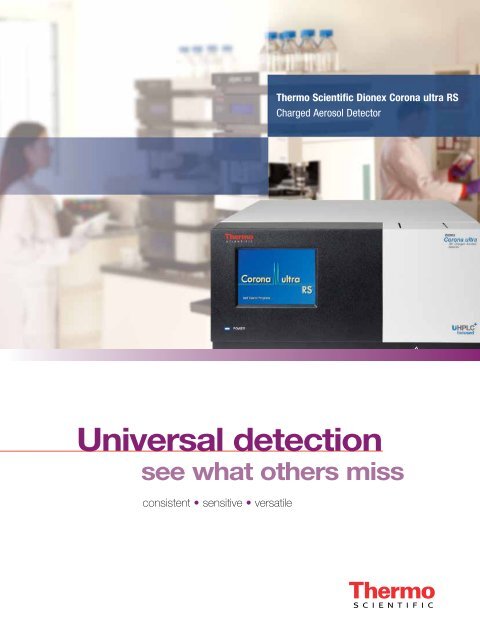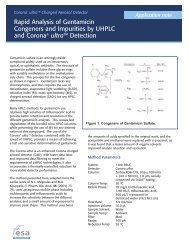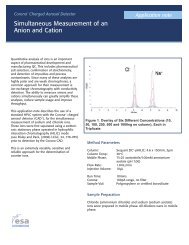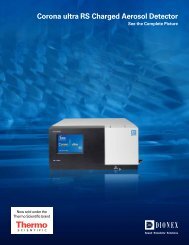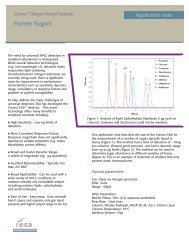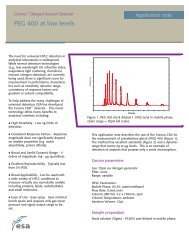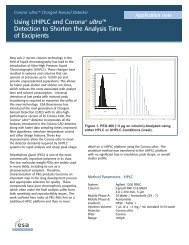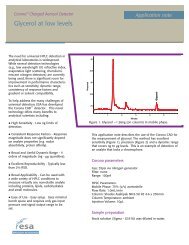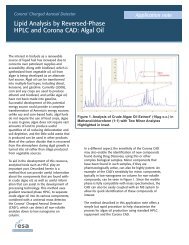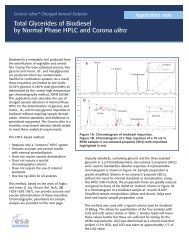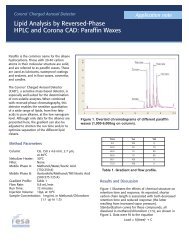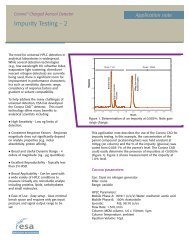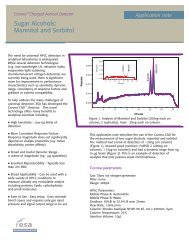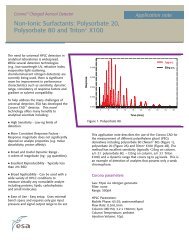Thermo Scientific Dionex Corona ultra RS Charged Aerosol Detector
Thermo Scientific Dionex Corona ultra RS Charged Aerosol Detector
Thermo Scientific Dionex Corona ultra RS Charged Aerosol Detector
Create successful ePaper yourself
Turn your PDF publications into a flip-book with our unique Google optimized e-Paper software.
<strong>Thermo</strong> <strong>Scientific</strong> <strong>Dionex</strong> <strong>Corona</strong> <strong>ultra</strong> <strong>RS</strong><br />
<strong>Charged</strong> <strong>Aerosol</strong> <strong>Detector</strong><br />
Universal detection<br />
see what others miss<br />
consistent • sensitive • versatile
Going beyond HPLC<br />
The Problem—Detection<br />
No HPLC or UHPLC detector is perfect. UV detection is the most<br />
widely used technique, but it fails to detect compounds without<br />
chromophores. Other universal detectors do not combine application<br />
versatility with reliability. This results in detection gaps.<br />
The Solution<br />
The <strong>Thermo</strong> <strong>Scientific</strong> <strong>Dionex</strong> <strong>Corona</strong> <strong>ultra</strong> <strong>RS</strong> <strong>Charged</strong><br />
<strong>Aerosol</strong> <strong>Detector</strong> is the solution. <strong>Charged</strong> aerosol detection delivers<br />
performance that refractive index (RI), low-wavelength UV, and<br />
evaporative light scattering (ELS) detectors simply cannot match. It<br />
measures analytes that other technologies fail to detect. <strong>Charged</strong><br />
aerosol detection has greater sensitivity, wider dynamic range, and<br />
more consistent response. Virtually every pharmaceutical company<br />
has adopted charged aerosol detection.<br />
The <strong>Corona</strong> <strong>ultra</strong> <strong>RS</strong> detector goes beyond simple HPLC. It<br />
combines all the benefits of charged aerosol detection with the high<br />
speed and increased resolution of UHPLC.<br />
The <strong>Corona</strong> <strong>ultra</strong> <strong>RS</strong> <strong>Detector</strong> Sees the<br />
Complete Picture<br />
The <strong>Corona</strong> <strong>ultra</strong> <strong>RS</strong> detector can be used with the<br />
most up-to-date UHPLC technology to measure<br />
analytes that cannot be seen by UV and may not<br />
be readily detected by mass spectrometry.<br />
With the flexibility and performance for analytical<br />
R&D, and the simplicity and reproducibility needed<br />
for manufacturing QC/QA, the <strong>Corona</strong> <strong>ultra</strong> <strong>RS</strong><br />
detector can be used for the analysis of<br />
pharmaceuticals (large and small molecule),<br />
biofuels, foods and beverages, specialty chemicals,<br />
and counterions. The detector can also be used in<br />
a range of applications from basic research to<br />
quality control.<br />
Comparison of <strong>Charged</strong> <strong>Aerosol</strong> Detection to UV and MS<br />
UV at 220 nm<br />
UV at 254 nm<br />
<strong>Corona</strong> <strong>ultra</strong> <strong>RS</strong> <strong>Detector</strong> Benefits<br />
Void + Cl -<br />
Propanolol<br />
Ketoprofen<br />
Verapamil<br />
• Consistent response independent of<br />
chemical structure<br />
<strong>Charged</strong> <strong>Aerosol</strong><br />
Detection<br />
• Compatibility with UHPLC<br />
• Simple and easy to use<br />
MS TIC<br />
(+ ion scan 150-500AMU)<br />
0 0.5 1 1.5 2<br />
Minutes<br />
2
<strong>Charged</strong> <strong>Aerosol</strong> Detection<br />
What makes any detector useful is its ability to accurately measure<br />
a wide range of analytes with consistent response. However, most<br />
detectors exhibit limitations. Often, one analyte responds more<br />
strongly than another, or may not respond at all.<br />
The <strong>Corona</strong> <strong>ultra</strong> <strong>RS</strong> detector measures charge that is imparted to<br />
analyte particles, with the charge being in direct proportion to the<br />
amount of the analyte in the sample. Measuring this charge is<br />
accurate and consistent, regardless of the analyte.<br />
The result is that the detector can quantify any<br />
nonvolatile analyte—this includes those without<br />
chromophores or those that cannot ionize—thus<br />
providing a consistent response that is independent<br />
of chemical structure. With charged aerosol<br />
detection, you can even measure many<br />
semivolatile analytes.<br />
Simplicity in Operation<br />
Step One<br />
<strong>Charged</strong> aerosol detection<br />
begins by nebulizing the eluent<br />
into droplets, which are<br />
subsequently dried into particles.<br />
The particle size increases with<br />
the amount of analyte.<br />
Step Two<br />
A stream of positively charged<br />
gas collides with the analyte<br />
particles. The charge is then<br />
transferred to the particles–the<br />
larger the particles, the greater<br />
the charge.<br />
Step Three<br />
The particles are transferred to a<br />
collector where the charge is<br />
measured by a highly sensitive<br />
electrometer. This generates a<br />
signal in direct proportion to the<br />
quantity of analyte present.<br />
Nebulizer and Impactor<br />
HPLC Column Eluent<br />
Analyte is<br />
nebulized and<br />
dried to produce<br />
particles<br />
Signal Out<br />
Gas Inlet<br />
Ion Trap<br />
Collector<br />
Analyte particles transfer<br />
their charge to a<br />
sensitive electrometer<br />
Largest droplets<br />
are eliminated<br />
Positive charge added<br />
to gas stream<br />
Positive charge is transferred<br />
to analyte particles<br />
3
Consistent response and a<br />
wide dynamic range<br />
Consistent Response<br />
The magnitude of response obtained<br />
for nonvolatile analytes using charged<br />
aerosol detection is independent of<br />
chemical structure. This is demonstrated in<br />
the figure to the right, where response by flow<br />
250,000<br />
200,000<br />
150,000<br />
<strong>Detector</strong> Response for Nonvolatiles<br />
10.7% <strong>RS</strong>D variation in CAD response<br />
among 1.0 µg samples by flow injection<br />
injection analysis is very similar for equivalent<br />
100,000<br />
amounts of a wide variety of analytes. The<br />
detector response does not depend on<br />
analyte optical properties as with <strong>ultra</strong>violet<br />
(UV) absorbance, or the ability to ionize as<br />
with mass spectrometry (MS). This is critical<br />
for studies dependent on mass balance<br />
50,000<br />
0<br />
Nortriptyline<br />
Salicylic acid<br />
Fructose<br />
Homocysteine<br />
Sucrose<br />
Dextrin<br />
Umbelliferone<br />
Glutathione<br />
Amitriptyline<br />
Methionine<br />
Lactose<br />
Glucose<br />
Analyte<br />
Propranolol<br />
Progestrone<br />
Dibucaine<br />
Cyclodextrin<br />
Adrenosterone<br />
Glucosamine<br />
Tartaric acid<br />
Primidone<br />
Gentisic acid<br />
Papaverine<br />
4 Aminoquinaldine<br />
Warfarin<br />
assessment or where UV response varies<br />
greatly. The response with charged aerosol<br />
detection is predictable.<br />
Wide Dynamic Range<br />
The <strong>Corona</strong> <strong>ultra</strong> <strong>RS</strong> detector is unique among universal detectors in<br />
that it allows quantitation across a range that exceeds four orders of<br />
magnitude. This wide dynamic range provides significant advantages<br />
for the simultaneous measurement of an analyte and low-level<br />
impurities in a single run. In the forced degradation example shown<br />
below, trace levels of degradant are found at the 0.19% level—well<br />
above the limit of detection. The wide dynamic range means that the<br />
low-level impurity and the active<br />
pharmaceutical ingredient (API) can be<br />
measured in the same run. With response<br />
independent of structure, relative levels can<br />
140<br />
be assessed even without knowing the<br />
identity of the peak.<br />
600<br />
mV<br />
20 minutes<br />
heating<br />
10 minutes<br />
heating<br />
Forced Degradation<br />
Amikacin<br />
mV<br />
0<br />
no<br />
heating<br />
0.4 0.6 0.8<br />
Degradant<br />
Impurities<br />
Impurities<br />
0<br />
0 0.5 1 1.5 2 2.5 3 3.5 4<br />
Minutes<br />
4
Enhanced performance<br />
Enhanced Sensitivity<br />
The <strong>Corona</strong> <strong>ultra</strong> <strong>RS</strong> detector provides an enhancement in sensitivity<br />
when used with UHPLC. Sub-nanogram levels of detection can be<br />
readily achieved, but there is more than just greater sensitivity. More<br />
importantly, the level of sensitivity is consistent across analyte types.<br />
Complementary to UV and MS Detection<br />
The <strong>Corona</strong> <strong>ultra</strong> <strong>RS</strong> is an ideal primary detector. However, when<br />
combined with UV, diode array detection (DAD), or MS, it provides<br />
an orthogonal and complementary detection mechanism, allowing<br />
you to obtain additional analytical data.<br />
Achieving New Levels of Sensitivity<br />
Glucose Sucrose Lactose<br />
500 pg of each sugar<br />
on column<br />
˜50 ng of each sugar<br />
on column<br />
Even More with UHPLC<br />
The high acquisition rate and low-peak dispersion of the <strong>Corona</strong><br />
<strong>ultra</strong> <strong>RS</strong> detector allows you to exploit the increased separation<br />
speed and resolution of UHPLC, giving results that are 5–10 times<br />
faster than standard HPLC.<br />
When used with the <strong>Thermo</strong> <strong>Scientific</strong> <strong>Dionex</strong> UltiMate 3000 <strong>RS</strong>LC<br />
x2 Dual System employing inverse gradient capability, relative<br />
peak response becomes a practical reality, providing the benefit<br />
of consistent response across the entire gradient range. Now,<br />
you can determine relative purity or level of degradation even<br />
without standards.<br />
The <strong>Corona</strong> <strong>ultra</strong> <strong>RS</strong> detector incorporates<br />
capabilities to make applications easier,<br />
including:<br />
• An internal valve to send unwanted<br />
analytes to waste<br />
• An optional flow splitter for easier<br />
interfacing with MS<br />
• A flow diversion system to eliminate<br />
waste overfilling<br />
• A unique algorithm for data processing<br />
• All the filter settings of the <strong>Corona</strong> CAD<br />
For Ultimate Performance...<br />
Combine the <strong>Corona</strong> <strong>ultra</strong> <strong>RS</strong><br />
with the UltiMate 3000 x2 pump for<br />
cost-effective gradient compensation,<br />
providing an ideal tool for approximation<br />
of relative concentrations when standards<br />
are not available.<br />
5
Intuitive, simple to operate, and easy<br />
Ease of Use<br />
The <strong>Corona</strong> <strong>ultra</strong> <strong>RS</strong> detector is virtually plug-and-play. It uses<br />
touchscreen technology that is easy to navigate. There are few<br />
parameters to set, and the few options are displayed on a single<br />
screen. Instrumental parameters are explained on the screen to<br />
allow easy choice of settings. This simple, intuitive operation means<br />
the detector can be quickly installed, enabling you to quickly begin<br />
generating data.<br />
Diagnostics<br />
A diagnostic screen provides all the information necessary to assure<br />
that the detector is working correctly. In addition, values are easy to<br />
interpret. This function provides information to help with instrument<br />
and method validation and troubleshooting. The detector even<br />
prompts you when it is time for preventive maintenance.<br />
Solvent Compatibility and Conservation<br />
Virtually any volatile solvent can be used with the <strong>Corona</strong> <strong>ultra</strong> <strong>RS</strong><br />
detector without concern for compatibility or UV cutoff. When used<br />
with UHPLC, run times can be reduced by a factor of 5–10 times.<br />
This saves solvent and reduces waste.<br />
Reproducibility and Reliability<br />
<strong>Charged</strong> aerosol detection is highly reproducible.<br />
The figure below shows the overlay of five runs.<br />
The peak shapes and responses are so<br />
reproducible that it is difficult to distinguish the<br />
individual runs. <strong>RS</strong>Ds of less than 1% are typical.<br />
Data from 150 randomly selected units over a<br />
six-month period show an inter-unit variability of<br />
approximately 2.5%. This means that you can<br />
expect the same results independent of the<br />
location of the detector.<br />
400<br />
Comparison of UHPLC to HPLC<br />
400<br />
200<br />
PEG 400<br />
Overlay of five injections<br />
0<br />
0 1 2<br />
3<br />
4 5<br />
200<br />
UHPLC<br />
HPLC<br />
0<br />
0 2.5 5<br />
7.5<br />
10<br />
Minutes<br />
12.5 15 17.5<br />
6
to integrate<br />
Easily Integrates with any HPLC System<br />
The <strong>Corona</strong> <strong>ultra</strong> <strong>RS</strong> detector can be used with any standard HPLC<br />
system, but is also ready for UHPLC without any modification.<br />
The detector is designed to integrate into any liquid chromatographic<br />
system, HPLC or UHPLC, from any manufacturer. Software<br />
drivers are available for the <strong>Thermo</strong> <strong>Scientific</strong> <strong>Dionex</strong><br />
Chromeleon Chromatography Data System, as well as<br />
ChemStation ® , EZChrom ® , and Empower ® software. The stackable<br />
design and rugged construction allow it to be placed anywhere in a<br />
system. There is no concern about moving or tipping the detector.<br />
4<br />
pA<br />
Flow Diversion<br />
Overlay of multiple injections<br />
3<br />
pA<br />
0<br />
-.50<br />
0.3 0.6 0.9 1.2 1.5<br />
Minutes<br />
Makes Using the System Simple<br />
An on-board switching valve allows flow diversion of<br />
high-salt samples during the analysis to simplify the<br />
chromatogram. The same valve can be used to divert<br />
flow to a different detector without having to<br />
disassemble the system. There is nothing to obtain<br />
separately, nothing that needs to be installed. It is all<br />
built into the detector. An optional variable-ratio flow<br />
splitter is available to integrate with MS or other<br />
parallel detectors without loss of resolution.<br />
0<br />
2<br />
1<br />
Original chromatogram<br />
Chromatogram with flow diversion<br />
-0.5<br />
0.3 0.5<br />
1 1.5<br />
2<br />
Minutes<br />
7
Application solutions<br />
180<br />
-5<br />
Monoglycerides<br />
Steroids<br />
Fatty Acids<br />
Fatty Alcohols<br />
Sterols<br />
Algal Oil Lipid Profile<br />
Phospholipids<br />
Diglycerides<br />
Triglycerides<br />
0 5 10 15 20 25 30 35 40 45 50 55 60 65 72.7<br />
Minutes<br />
Lipids<br />
HPLC is a powerful tool for lipid<br />
analysis. With UV detection,<br />
quantitation is made difficult by<br />
differing relative response due to the<br />
wide variety of structures. Other<br />
universal detectors demonstrate a<br />
lack of response consistency making<br />
relative quantification difficult. With<br />
response independent of chemical<br />
structure, charged aerosol detection<br />
delivers consistent, predictable<br />
results with no optimization.<br />
550<br />
300<br />
20.3<br />
pA<br />
Total Glycerides of Biodiesel<br />
Triolein<br />
1.4<br />
5.95 7.5 8.75 9.95<br />
Minutes<br />
1,3-Diolein<br />
9.75<br />
pA<br />
56 ng<br />
Glycerol<br />
6.93<br />
28.28 29 29.33<br />
Minutes<br />
The same detector can be used to<br />
assess purity or to perform<br />
in-process quality control of biodiesel.<br />
1-Oleylglycerol<br />
0<br />
-50<br />
0 5 10 15 20 25 30 35 39.4<br />
Minutes<br />
300<br />
mV<br />
0<br />
Carbohydrates<br />
1<br />
2<br />
3<br />
0 2 4 6 8 10<br />
Minutes<br />
4<br />
5<br />
1. Fucose<br />
2. Fructose<br />
3. Glucose<br />
4. Sucrose<br />
5. Lactose<br />
Carbohydrates<br />
Sugar analysis using HPLC is often<br />
performed using RI detection. But RI<br />
detection is limited by poor sensitivity<br />
and the inability to use gradients. The<br />
<strong>Corona</strong> <strong>ultra</strong> <strong>RS</strong> provides gradient<br />
separations and sensitivity to low ng.<br />
It also offers the ability to use<br />
reversed-phase and HILIC modes of<br />
separation, making it an ideal complement<br />
to analysis with HPAE-PAD.<br />
8
Surfactants<br />
Surfactants such as Triton ® X-100,<br />
which lacks a chromophore, can be<br />
easily measured with the <strong>Corona</strong><br />
<strong>ultra</strong> <strong>RS</strong> detector. Unlike some other<br />
universal detectors, the wide<br />
dynamic range of charged aerosol<br />
detection technology lets you assay<br />
a full range of concentrations<br />
without overloading the detector.<br />
900<br />
500<br />
0<br />
9<br />
0<br />
-3<br />
0 1 2 3 4 5 6 7 8 9 10 11 12 13<br />
Surfactants<br />
<strong>Corona</strong> <strong>ultra</strong> <strong>RS</strong> (n = 5)<br />
0 2 4 6 8 10 12 14 16 18 20 22 24 26<br />
1000<br />
10<br />
Other nebulizer-based detector (n = 1)<br />
50<br />
2<br />
500<br />
0<br />
19.20 20 21.20<br />
1.1<br />
1 6 12<br />
<strong>Detector</strong><br />
overload<br />
0<br />
0 2 4 6 8 10 12 14 16 18 20 22 24 26<br />
Minutes<br />
Unique Data Algorithm<br />
The <strong>Corona</strong> <strong>ultra</strong> <strong>RS</strong> includes<br />
firmware to apply a power function to<br />
the data output, often decreasing<br />
baseline noise and linearizing the<br />
data. With a few injections the ideal<br />
setting can be determined.<br />
1.5<br />
pA<br />
0<br />
-0.5<br />
0.70<br />
pA<br />
0<br />
1<br />
2<br />
Primidone<br />
Primidone<br />
Hydrocortisone<br />
Hydrocortisone<br />
Effect of Power Function<br />
-0.25<br />
0.17 0.5 1 1.4<br />
Ketoprofen<br />
Ketoprofen<br />
Warfarin<br />
Warfarin<br />
Progesterone<br />
Progesterone<br />
Response (peak area) Response (peak area)<br />
3<br />
1.5<br />
0<br />
2<br />
1<br />
0<br />
0 500 1000 1500 2000 2500<br />
Mass on Column (ng)<br />
0 500 1000 1500 2000 2500<br />
Mass on Column (ng)<br />
Minutes<br />
9
Application solutions<br />
Pharmaceutical Analysis<br />
Product Characterization<br />
The <strong>Corona</strong> <strong>ultra</strong> <strong>RS</strong> detector makes it easy to<br />
determine the concentration and purity of any<br />
non- and many semivolatile active pharmaceutical<br />
ingredients (APIs) and excipients. With response<br />
independent of the chemical nature of the<br />
analyte, almost any API or compound used<br />
in the formulation can be measured with<br />
predictable response.<br />
28<br />
DL-Leucine<br />
D-Phenylalanine<br />
Typical Pharmaceutical Agents<br />
5 overlaid concentrations from 11–170 ng<br />
Acetaminophen<br />
Theophylline<br />
-2.8<br />
0.12 1 2 3 3.95<br />
Minutes<br />
Erythromycin<br />
Naproxen Na<br />
Diclofenac Na<br />
Dodecylsulfate Na<br />
Progestrone<br />
Using the unique <strong>Thermo</strong> <strong>Scientific</strong> Acclaim <br />
Trinity P1 column and the <strong>Corona</strong> <strong>ultra</strong> <strong>RS</strong><br />
detector, the API, counterion, and impurity<br />
ions can all be quantified, simultaneously. This<br />
speeds up selection of counterions in the<br />
development process.<br />
10.5<br />
Sodium<br />
API and Counterions<br />
Chloride<br />
Diclofenac<br />
0.15% Chloride Spike<br />
0.1% Chloride Spike<br />
No Spike<br />
-5<br />
0 1 2 3 4 5<br />
Minutes<br />
Cleaning Validation<br />
Cleaning validation can be both difficult and time<br />
consuming. Using the <strong>Corona</strong> <strong>ultra</strong> <strong>RS</strong> detector, it<br />
is possible to measure the API and cleaning agents,<br />
either separately or together, as well as estimate<br />
their relative amounts. A profile representing the<br />
relative amounts of cleaning agent can be<br />
generated even without knowing the identity<br />
of the components.<br />
110<br />
–10<br />
Typical Cleaning Agent<br />
0 1.3 2.5 3.8 5.0 6.3 7.5 8.8 10.0<br />
Minutes<br />
10
3.0<br />
0.1% PEG<br />
Pegylated Protein<br />
PEG-MAb 50 µg o.c.<br />
Biopharmaceutical Analysis<br />
Analysis of biopharmaceuticals present new<br />
challenges. Complex mixtures of large and small<br />
molecules, many without chromophores, can be<br />
analyzed using charged aerosol detection.<br />
50<br />
Cationic Cell-Penetrating Peptides<br />
MPG<br />
Transportan<br />
Syn B1<br />
0 1 2<br />
3 4 5 6<br />
7 8.2<br />
Minutes<br />
50<br />
2.0<br />
1.0<br />
6.09<br />
pA<br />
0.3% PEG<br />
0.2% PEG<br />
0.1% PEG<br />
0 10 20<br />
Minutes<br />
Fast-Acting Insulin<br />
Unknowns<br />
0.53<br />
10.23 Minutes 12.96<br />
Insulin<br />
PEGylated MAb<br />
PEGylation helps the biological stability of<br />
therapeutic monoclonal antibodies (MAbs) but<br />
measuring the residual PEG can be difficult. With<br />
predictable response irrespective of the analyte,<br />
charged aerosol detection can be used to measure<br />
residual PEG in PEGylated proteins. With its<br />
sensitivity and dynamic range, both low levels of<br />
the PEG impurity and the high levels of PEGylated<br />
protein can be measured together, without the<br />
need to reanalyze the sample.<br />
siRNA Delivery Vehicles<br />
The use of siRNA as a therapeutic agent requires<br />
optimized delivery vehicles. The detector lets you<br />
measure the purity and stability of both lipids and<br />
peptides used in these delivery systems.<br />
Final Product Purity<br />
<strong>Charged</strong> aerosol detection is ideal for peptide and<br />
protein analysis. With no restriction on solvents, as<br />
with UV, this detector gives you a greater range of<br />
selectivity. And you never need worry about<br />
acetonitrile shortages again!<br />
From raw material qualification to final product<br />
purity of large or small molecules, the <strong>Corona</strong> <strong>ultra</strong><br />
<strong>RS</strong> detector lets you see things as you have never<br />
seen them before.<br />
0<br />
-5<br />
0 2 4 6<br />
8 10 12 14 16.1<br />
Minutes<br />
11
Discover the <strong>Corona</strong> <strong>ultra</strong> <strong>RS</strong> <strong>Detector</strong>–Giving You More<br />
for HPLC and UHPLC<br />
In the world of HPLC/UHPLC, one detection technology stands out.<br />
<strong>Charged</strong> aerosol detection has response independent of analyte<br />
structure, provides consistent responses across a range of non- and<br />
semivolatile analytes, has a wide dynamic range and broad<br />
applicability, and is as easy to use as UV.<br />
The <strong>Corona</strong> <strong>ultra</strong> <strong>RS</strong> detector combines the benefits of charged<br />
aerosol detection with the speed and resolution of UHPLC for faster,<br />
high-resolution separations while still giving superior performance<br />
with HPLC. This detector provides the flexibility and performance for<br />
analytical R&D, and the simplicity and reproducibility needed for<br />
manufacturing QC/QA. It can be used for almost any analysis in<br />
pharmaceuticals (large and small molecule), biofuels, foods and<br />
beverages, specialty chemicals, and ions including a wide range of<br />
applications—from basic research to quality control. This makes the<br />
<strong>Corona</strong> <strong>ultra</strong> <strong>RS</strong> the detector of choice for your application.<br />
www.thermoscientific.com/charged_aerosol<br />
©2012 <strong>Thermo</strong> Fisher <strong>Scientific</strong> Inc. All rights reserved. ISO is a trademark of the International Standards Organization.<br />
Chemstation and EZChrom are registered trademarks of Agilent Technologies. Empower is a registered trademark of Waters<br />
Corporation. Triton is a registered trademark of Dow Chemical Co. All other trademarks are the property of <strong>Thermo</strong> Fisher <strong>Scientific</strong><br />
Inc. and its subsidiaries. Specifications, terms and pricing are subject to change. Not all products are available in all countries. Please<br />
consult your local sales representative for details.<br />
<strong>Thermo</strong> <strong>Scientific</strong> <strong>Dionex</strong> products are<br />
designed, developed, and manufactured<br />
under an ISO 9001 Quality System.<br />
Australia +61 3 9757 4486<br />
Austria +43 1 333 50 34 0<br />
Belgium +32 53 73 42 41<br />
Brazil +55 11 3731 5140<br />
China +852 2428 3282<br />
Denmark +45 70 23 62 60<br />
France +33 1 60 92 48 00<br />
Germany +49 6126 991 0<br />
India +91 22 2764 2735<br />
Italy +39 02 51 62 1267<br />
Japan +81 6 6885 1213<br />
Korea +82 2 3420 8600<br />
Netherlands +31 76 579 55 55<br />
Singapore +65 6289 1190<br />
Sweden +46 8 473 3380<br />
Switzerland +41 62 205 9966<br />
Taiwan +886 2 8751 6655<br />
UK/Ireland +44 1442 233555<br />
USA and Canada +847 295 7500<br />
BR70193_E 12/12S


